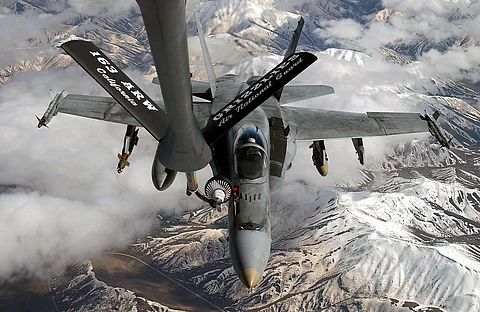

Tensions in the Middle East escalated sharply on Wednesday amid ongoing but stalled nuclear negotiations between the United States and Iran.
The U.S. government has ordered the partial evacuation of its embassy in Baghdad. According to Reuters, non-essential personnel and dependents of military personnel are being withdrawn from the country. The evacuation order has reportedly been extended to Kuwait as well, according to the Associated Press.
The United Kingdom Maritime Trade Operations (UKMTO) issued a travel advisory for the Persian Gulf, warning vessels to exercise increased caution due to “heightened tensions in the region.”
In Bahrain, the U.S. Naval Forces Central Command, which hosts the U.S. 5th Fleet, has been placed on high alert. Families of service members have been instructed to prepare for a potential evacuation.
The heightened alert comes just ahead of a key vote at the International Atomic Energy Agency (IAEA) on Thursday. Western powers are expected to introduce a resolution declaring Iran to be in non-compliance with the Nuclear Non-Proliferation Treaty (NPT). If passed, the move could prompt the United Kingdom, France, and Germany—the so-called "E3"—to trigger the snapback mechanism and reimpose sanctions on Iran that were lifted under the 2015 nuclear deal. Tehran has repeatedly warned against such actions.
Iranian Defense Minister Aziz Nasirzadeh issued a stern warning on Wednesday, telling reporters: “If a conflict is imposed on us ... all U.S. bases are within reach,”.
Iranian media outlet Tasmin also reported that Iran tested a new ballistic missile last week capable of carrying a 2,000-kilogram warhead.
Meanwhile, in aninterview on Wednesday, U.S. President Donald Trump expressed growing pessimism about reaching a deal with Tehran. “I don’t know. I did think so, and I’m getting more and more—less confident about it,” Trump said.
On Tuesday, the commander of U.S. Central Command (CENTCOM), General Michael "Erik" Kurilla testified before Congress, revealing that he had presented President Trump and Secretary of Defense Pete Hegseth with a range of potential military strike options against Iran.
The 6th round of indirect talks between Washington and Tehran are due to take place on Sunday in Oman.